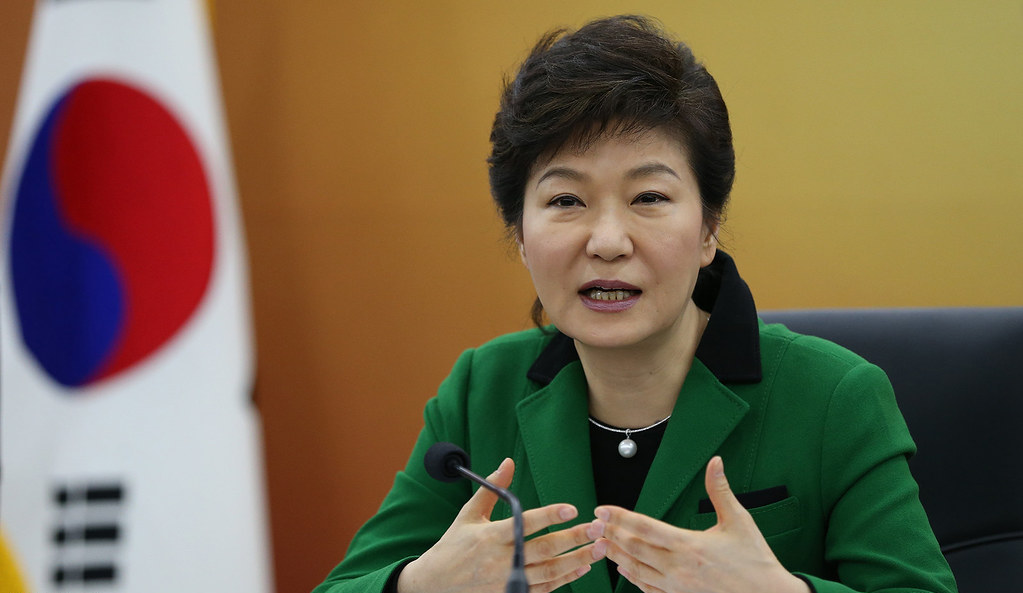Park Geun-hye, former President of South Korea, is to be pardoned by President Moon Jae-in on Friday (December 31st). Park was serving prison time for bribery and abuse of power following 2017’s “Choi Soon-sil gate” scandal. South Korea’s Justice Minister, Park Beom-kye, explained the pardon came from a “perspective of national unity” in the face of the adversities from the Covid-19 pandemic.
Park Geun-hye is the daughter of former South Korean leader Park Chung-hee, who led the government between 1963 and his assassination in 1979. His 17 year rule was characterised by it’s repressiveness: with supression of opposition parties, limits to the freedom of citizens and the press, and expansion of the Korean Central Intelligence Agency (today the National Intelligence Service) – all justified as measures to “fight communism”.
Park Geun-hye won the presidency in 2013 as candidate for the conservative Saenuri Party, but did not see her first term to completion, due to the Choi Soon-sil scandal. Park was impeached on December 9th 2016, accused of bribery, abuse of presidential power, and leaking state secrets. Much of this centred around the role of Park’s longtime friend Choi Soon-sil, who – despite no official title or security clearance – intervened in government policy and followed corrupt practices to enrich herself and her family.
Such corrupt practices saw Park engage in the inappropriate pressuring of large family-owned conglomerates (Chaebols), to fund foundations and businesses established by Choi. This included in total $65.5 million of funding from Samsung and Hyundai being given to two foundations owned by Choi. In addition to these favours, Park directed presidential aids to give confidential documents to Choi, who with only an informal role in advising the President, had no legal standing to view such material.
It was following this scandal that the “candlelight movement” emerged, concerned not only with Park’s corruption but the government’s broader failures to adress severe economic and social inequalities. Weeks of mass mobilisation began, some days seeing over one million people demonstrating. Across twenty consecutive Saturday nights, 16 million Koreans came out in protest. It was much of this anger with government corruption, the role of powerful corporations, and the failures of neoliberal policy, that Moon Jae-in tapped into with his successful bid to succeed Park Geun-hye.
Yet, four years into his term, President Moon’s administration has failed to reflect the will of these millions. This is not simply just due to the pardoning of Park Geun-hye, but for failing in his pledge to distance the administration from the big conglomerates. “Under the Moon Jae-in government,” he promised in his inaugural address, “the term “politics-business collusion” will disappear completely.” However, Moon has willingly worked alongside powerful companies to promote his economic initiatives, such as his attendance alongside Samsung leadership to the opening of a Samsung factory in India.
Moon even offered a special advisor role to Hong Seok-hyun, brother-in-law to Samsung’s former chairman, and the president of one of South Korea’s three largest newspapers, JoongAng Ilbo. Hong turned the offer down, but for Moon to seek the “Special Advisor to the President on unification, diplomacy and national security” to be a senior figure in the business world certainly does not reflect an end to “politics-business collusion”.
President Moon argues Park Geun-hye’s health is a key reason for her pardoning, as Park, age 69, has been hospitalised three times in 2021: “We should move into a new era,” argued Moon, “by getting over the pains of the past. It’s time to boldly pull together all our strengths for the future rather than fighting against each other while being preoccupied with the past. In the case of former President Park, we considered the fact that her health condition has deteriorated a lot after serving nearly five years in prison.” Park will be one of 3,094 people pardoned by Moon on the last day of this year.
Philip English, is a member of the YCL’s Birmingham branch



